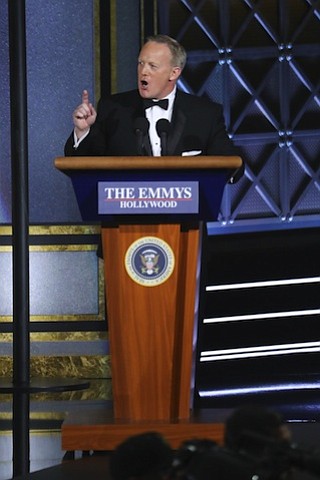Emmys Cast President Trump in Key Supporting Role
CNN/Stylemagazine.com Newswire | 9/18/2017, 7:16 a.m.
By Brian Lowry, CNN
(CNN) -- In terms of politics the Emmys join the award-show party late, after the Golden Globes, Grammys, Oscars and Tonys have all taken whacks at the Trump presidency. Yet the president's preferred medium provided fertile terrain for satirizing and commenting upon the political moment, a mood that permeated everything from host Stephen Colbert's monologue to the diverse winners and onstage banter.
Colbert -- a beneficiary of anti-Trump sentiment with the surge in ratings for his "Late Show" -- made Trump a centerpiece of his opening material and song. Indeed, he blamed Emmy voters for depriving Trump of an award during his "Apprentice" days that might have kept him out of politics, saying, "I thought you people liked morally compromised antiheroes," later adding, "Unlike the presidency, Emmys go to the winner of the popular vote."
Still, those not-entirely-unexpected gags (Colbert joked about having the "courage" to lampoon Trump in a room whose politics tilt heavily left), and a genuinely surprising appearance by former White House press secretary Sean Spicer, were only the tip of the iceberg. The president's presence hovered throughout the evening, beginning with "Saturday Night Live's" strong showing, honoring Alec Baldwin -- who played Trump on the show -- and Kate McKinnon, who thanked her alter ego, Hillary Clinton, for her grace.
"At long last, Mr. President, here is your Emmy," Baldwin quipped in his acceptance speech.
Trump-themed barbs came from various directions, including a reunion of "9 to 5" stars Lily Tomlin, Jane Fonda and Dolly Parton, who spoke of giving a bigot his comeuppance then and now; and "Veep's" Julia Louis-Dreyfus, who dryly suggested an impeachment storyline was jettisoned because the writers feared someone else might beat the HBO comedy to the punch. Even John Lithgow's praise of Winston Churchill, who he played in "The Crown," had a political tinge to it.
The Emmys also featured a seemingly effortless display of diversity, in a way the Oscars might envy. That aspect of television was celebrated both in a video package and on an impromptu basis by Donald Glover's dual wins for "Atlanta," Sterling K. Brown for "This is Us," and Aziz Ansari and Lena Waithe claiming the writing award -- Waithe being the first African-American woman to receive that prize.
Additional context applied to the strong showings by "Big Little Lies," which dealt with domestic abuse; and "The Handmaid's Tale," an adaptation of Margaret Atwood's dystopian novel that many saw as a perfectly timed drama when women's issues and abortion rights remain heated topics.
"More great roles for women, please," "Big Little Lies" star Nicole Kidman said from the stage, in what simultaneously sounded like an endorsement of TV and rebuke of the movie industry.
Similarly, the "Black Mirror" episode recognized as best TV movie, "San Junipero," focused on a lesbian love story.
Inevitably, there will be those offended by the tone and content of this year's telecast, although frankly, Hollywood's progressive bent is by now pretty well baked into the award-show calculus.
Trump, of course, wasn't Colbert's only target. The host's jokes ranged from Sen. Ted Cruz's Twitter account liking a porn video to HBO host Bill Maher triggering controversy by using the "N" word.
Still, as Colbert noted, the president has been the biggest TV story of the year, which provided the rationale for occupying a prominent role on TV's biggest and most self-congratulatory night.
More broadly, although the Emmys obviously serve multiple masters -- and the race to finish on time meant awkwardly playing off some major winners -- the show seemingly made good on its primary mandate: to celebrate the medium.
Much was made about the sheer abundance of quality television, with Colbert quipping that nobody except perhaps the president -- known for watching scads of cable news -- could possibly have the capacity to absorb it all.
Colbert (edged by "Last Week Tonight With John Oliver" for best variety series, a loss he amusingly punctuated with fellow also-ran Jimmy Kimmel) even assumed that Trump would tune in, addressing him directly. "Hello, sir, thank you for joining us. Looking forward to the tweets."
Whatever the president's opinion, an empty-handed Colbert, and the Emmys overall, mostly looked like winners.










